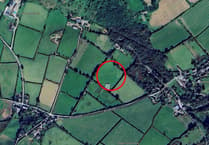A scheme for a rural Pembrokeshire ‘One Planet Development’, which would eventually include a charcuterie business using meats from a rare breed ‘flerd’ and a ‘natural health service’ has been turned down by county planners.
In an application to Pembrokeshire County Council, Malcolm and Nichola Blunsden sought permission for the ‘One Planet Development’ including a three-bed house, polytunnel and a freestanding photovoltaic array at Covert View, some one kilometre from the village of Jeffreyston, near Kilgetty.
A supporting statement through agent Sureline Design Services Ltd said of the applicants: “They have experience of managing this piece of land and are excited to have the opportunity to develop their ideas for an eco-house, rare breed ‘flerd’ [mixture of a flock and herd], a charcuterie business and a ‘natural health service’ that brings local community groups and schools closer to nature.”
Covering a five-year plan, it says the applicants would produce 56 per cent of their own food, with a small vegetable garden and polytunnel as well as a flock of chickens and ducks for eggs and meat, and will also keep geese, sheep, pigs and cattle for meat; the main enterprise on site will sell fresh meat and charcuterie products from the sheep, pigs and cattle.
“In addition to this they will develop a subsidiary enterprise based on community groups and general public visiting the site for educational and therapeutic purposes,” the statement adds.
Detailing the ‘Cleddau Charcuterie’ proposal, it says: “The overall objective is to use traditional rare breeds of Welsh farm animals, raise them in a dynamic ‘flerd’ (mixture of a flock and herd) to create a rich tapestry of diverse meadows in a regenerative ‘mob’ grazed system whilst also building soil carbon.”
It says the meats produced will be slaughtered and butchered locally and then cured in a purpose-built meat curing room, this will be located in one of the existing farm buildings on site.
“Research undertaken by Malcolm suggests a high demand for locally produced fresh meat as well as charcuterie products with known origins and high animal welfare. The nearest producer for charcuterie is currently in Powys.”
An officer report, recommending refusal raised concerns about the robustness of financial figures and realistic possibility of achieving them, with “almost 90 per cent of the projected income would come from a single source, namely meat products production,” adding: “There is no supporting evidence from local schools or groups for a demand for the services offered. It is considered that there is not sufficient certainty to conclude that a significant proportion of the applicants’ food and income needs would be met on the site within five years.”
It also raised concerns about insufficient water resources on the site with a borehole required for drinking water.
The planning committee also stated, that it had not been demonstrated that the proposed house would achieve zero carbon status in terms of construction and timetable.
The application was refused by planners.
Since the refusal, the application is listed as having an appeal against the decision lodged.




